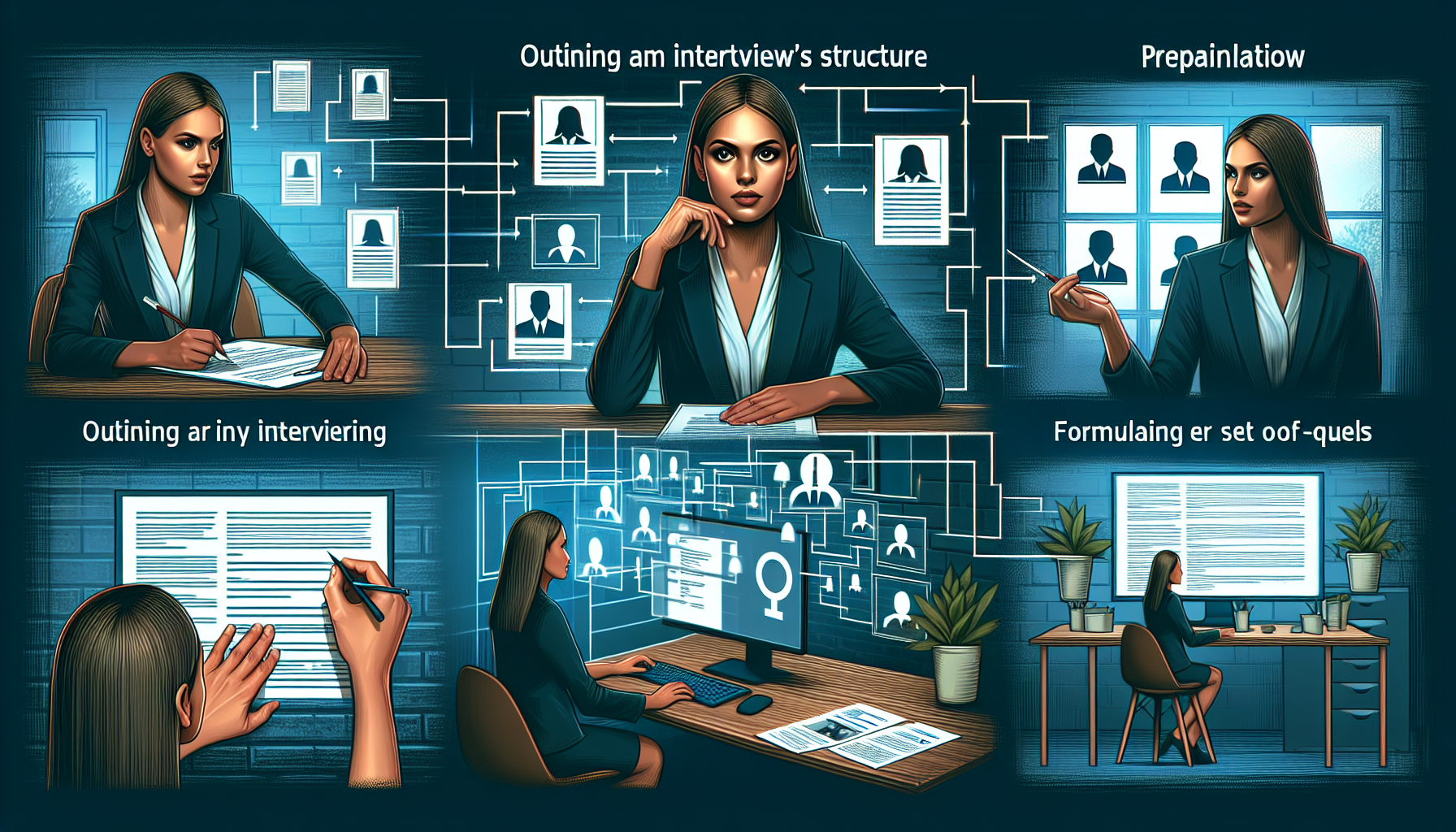The Art of Recruiting: Asking the Right Interview Questions
Asking the right questions during an interview is much more than merely a formality. It’s your opportunity to show genuine interest in the role, gauge company culture, and see if your career ambitions align with potential employers. Delving into the art of crafting questions for recruiters, you uncover the essence of engagement and curiosity that sets you apart as a candidate. Questions crafted with thoughtfulness not only reflect your enthusiasm but also your proactive approach to understanding the job’s scope and the company’s trajectory.
This article will navigate through the intricacies of interviewer questions, from the crucial role they play in the recruitment process to overcoming common challenges and integrating advanced techniques like psychometric tests and assessment centers. By focusing on effective strategies and evaluating candidate responses, you’ll learn how to ask insightful, open-ended recruiting interview questions—like those about career path and professional development—that create a positive impression and foster a meaningful dialogue about the job offer and working environment. Whether you’re preparing questions for an HR interviewer or seeking to refine your interview process, this guide offers valuable insights on securing that coveted job offer by asking the right questions at the right time.
Understanding the Recruiter’s Perspective
When you engage with a talent acquisition partner or recruiter, it’s crucial to clarify the responsibilities of the position you’re interested in. This initial conversation is not just about settling recruitment questions; it’s about defining the selection criteria that will guide the recruitment process. Recruiters play a pivotal role in ensuring that the selection committee is diverse, which helps in a balanced evaluation of candidates and ensures that the best-suited individual is chosen for the role.
Recruiters often delve into understanding a candidate’s communication skills, career trajectory, and skill alignment with the role during interviews. They might ask you to present an elevator pitch that succinctly tells who you are, what drives you, and where you see yourself in the company or your career in the long term. This helps them gauge not only your suitability for the role but also your long-term potential and ambitions, making it a critical moment to ask insightful recruiter questions.
Furthermore, recruiters are keen on understanding your motivations for moving on from your current role, your goals for the next role, and your availability to start. They may also inquire about your current level of compensation to establish a baseline for future salary negotiations. Knowing whether you are actively working with other recruiters can also influence their approach and urgency in the recruitment process. Before stepping into an interview, it’s beneficial for you to understand the specific job role, the company’s needs, and its culture to tailor your responses effectively and know what to ask a recruiter.
The Role of Interview Questions
Asking the right questions during an interview is pivotal in predicting a candidate’s future performance and ensuring a good fit within the company’s culture. Studies have shown that behavior-based interviewing can significantly increase the success rate of hires, boosting it from 19% with traditional methods to 75%. This approach focuses on a candidate’s past performance, which is often the most reliable indicator of their future success. By employing probing, open-ended recruitment interview questions, recruiters can glean deeper insights into a candidate’s skills, knowledge, and experience, moving beyond superficial answers to understand their true potential and problem-solving capabilities.

Structured interviewing is another critical aspect that enhances the recruitment process. This method involves a consistent set of questions that are prepared in advance and asked to all candidates. Such a structured approach not only helps maintain fairness and equality throughout the interview process but also guards against potential discrimination claims. It ensures that the interview does not deviate into informality, which can sometimes lead to biased assessments. Prepared questions encourage detailed responses and prevent candidates from giving generic yes or no answers, allowing recruiters to make more informed hiring decisions based on comprehensive information.
Moreover, interview questions are designed not just for the interviewer to evaluate the candidate but also for the candidate to assess the company and the role. It’s a two-way street where both parties gauge if there is a mutual fit. This dynamic can be particularly insightful when candidates use the STAR method (Situation, Task, Action, Result) to structure their responses, which showcases their problem-solving skills and ability to navigate complex work scenarios. Recruiters should encourage this format as it helps in evaluating the clarity, relevance, and depth of a candidate’s answers, ensuring they are not only able to ‘talk the talk’ but also ‘walk the walk.’
Common Challenges Recruiters Face
Recruiters often find themselves in a competitive market where reaching out to top candidates becomes a major hurdle. With numerous recruiters vying for the attention of the same skilled individuals, establishing a distinct employer brand is crucial. By leveraging platforms like LinkedIn to showcase unique career pages and sharing engaging employee stories on social media, recruiters can enhance their visibility and appeal to potential candidates.

Another significant challenge is dealing with candidates who are considering multiple job offers. This situation demands that recruiters differentiate their approach by enriching the interview experience. Providing comprehensive details about the role, facilitating interactions with future team members, and maintaining transparent communication about the application’s progress are strategic moves that can position their offer as the preferred choice.
Furthermore, the scarcity of talent possessing the requisite skills for specialized roles continues to be a pressing issue. To tackle this, recruiters should utilize data analytics to identify optimal recruitment locations and collaborate closely with hiring managers and Learning & Development teams. This collaboration helps in pinpointing which skills are essential and can be developed through internal training, thereby broadening the pool of potential candidates. Additionally, implementing online skills assessment tools ensures a fair and accurate evaluation of candidates’ technical abilities and soft skills, crucial for finding the right match for the company’s needs.
In managing relationships with hiring managers, recruiters often face the challenge of aligning expectations regarding candidate qualifications. Engaging in open, two-way discussions helps set realistic standards and clarifies the exact requirements of the role. For recruiters who may not have deep technical knowledge of the positions they are hiring for, it is advisable to consult with knowledgeable team members beforehand or request a brief educational session from hiring managers. This preparation, including understanding hr recruiter interview questions and knowing the right questions to ask hr recruiter during interview, is key to confidently addressing candidate inquiries and effectively assessing their suitability.
Lastly, efficient time management plays a vital role in a recruiter’s ability to handle their responsibilities effectively. Setting aside specific times for reviewing resumes and responding to emails, coupled with investing in robust applicant tracking systems, can significantly streamline the recruitment process, allowing recruiters to focus on engaging with candidates more personally and professionally.
Strategies for Effective Recruitment Interviewing
Effective recruitment interviewing is a critical component of the hiring process, ensuring that the right candidates are selected who fit both the job requirements and the company culture. Here are some strategies to enhance interviewing techniques:

Preparation and Planning
Before any interview, preparation is key. Begin by outlining the interview’s structure, which should include a clear set of questions that align with the job’s requirements and the company’s values. Utilize applicant tracking systems (ATS) and other technology to streamline scheduling and candidate tracking. This preparation helps in maintaining focus during the interview and allows for a smooth flow of conversation.
Conducting the Interview
During the interview, it is vital to create a comfortable and welcoming environment. Start by ensuring the interview space is private and free of distractions. Conduct the interview in a friendly tone, making sure to jot down important points and observations. This not only aids in remembering details but also in making the candidate feel heard. Use techniques like nodding and minor verbal affirmations to encourage candidates to elaborate on their answers.
Building Rapport and Gathering Data
Building a rapport with candidates can significantly affect the outcomes of the interview. Make an effort to put candidates at ease by minimizing interruptions and maintaining a conversational tone. Throughout the interview, engage in active listening, taking detailed notes that can later be analyzed both objectively and subjectively. Encourage candidates to ask good questions to a recruiter and provide them with the time needed to articulate their thoughts fully, fostering a two-way dialogue that can reveal deeper insights into their suitability for the role.
By integrating these strategies, recruiters can conduct more effective and fair interviews, leading to better hiring decisions and ultimately enhancing the organization’s human capital.
Integrating Technology into Recruitment Interviews
Integrating technology into recruitment interviews has revolutionized the way organizations handle the hiring process, making it more efficient and data-driven. Here are some key technologies that are shaping modern recruitment:
Automate Your Interview Process
- Applicant Tracking Systems (ATS) streamline the recruitment process by organizing, collecting, storing, and managing CVs and job applications. This technology allows for more efficient candidate screening and tracking.
- Artificial Intelligence (AI)AI plays a crucial role in enhancing the interview process. AI algorithms can intelligently scan and parse resumes, matching candidate skills with job requirements and evaluating a candidate’s soft skills to promote diverse and inclusive workplaces.
- Video Interviewing ToolsEmployers use AI to assess a candidate’s suitability more effectively by analyzing facial expressions, tone, and language, providing a deeper insight into the candidate’s capabilities and personality.

Enhance Recruitment with Predictive Analytics and Testing
- Predictive AnalyticsRecruitment technology utilizes historical data to forecast future hiring needs and trends, helping recruiters identify the right match for the company culture and job requirements. This approach aids in reducing employee turnover and increasing retention rates.
- Skills and Aptitude TestingTechnology ensures that candidates possess the required skills and knowledge before they even enter the interview room. Online assessments and testing platforms evaluate competencies and qualifications with high accuracy, making the preliminary screening process more reliable.
Streamline Communication and Onboarding
- Chatbots and AI-driven SupportChatbots provide instant responses to candidates’ inquiries, assist with the application process, and can be programmed to answer FAQs, schedule interviews, and perform initial screenings.
- Remote Onboarding ToolsModern HR tools offer digital training materials, video conferencing, and document management platforms to facilitate a smooth transition into the company for new hires, ensuring they feel integrated and valued from the start.
By leveraging these technologies, recruiters can free up valuable time previously spent on administrative tasks, focus more on engaging with candidates, and make informed decisions that lead to successful hiring outcomes.
Evaluating Candidate Responses
When recruiters evaluate candidate responses, they focus on a comprehensive set of skills and attributes that predict successful job performance and cultural fit. These include a blend of communication and interpersonal skills, analytical thinking, creativity, leadership potential, and a strong work ethic. Recruiters also assess candidates’ educational background, training relevancy, and any career-related experiences that align with the job requirements.
Candidate Evaluation Criteria
- Communication and Interpersonal Skills: Assess candidates’ ability to express ideas clearly and interact effectively with others.
- Analytical and Problem-solving Skills: Evaluate how candidates approach complex scenarios and their proficiency in finding effective solutions.
- Leadership and TeamworkRecruiters look for evidence of leadership experiences and the ability to work collaboratively within a team setting.
- Adaptability and InitiativeThey determine candidates’ readiness to adapt to new challenges and their willingness to take initiative.
- Cultural FitGauge how well candidates’ values and work style align with the company culture and values.
To streamline the evaluation process, recruiters often use standardized forms or templates that allow for a consistent assessment of all interviewees. This approach ensures that each candidate is rated based on the same criteria, which helps in maintaining fairness and objectivity in the recruitment process.
During the interview, it’s crucial to consider not only the content of the answers but also the delivery. Pay attention to the candidates’ demeanor, confidence, and professionalism. Observing non-verbal cues such as eye contact and body language can also provide insights into the candidates’ confidence and sincerity. After the interview, conducting thorough reference and background checks is essential to verify the accuracy of the resumes and the integrity of the candidates’ professional experiences.
Conclusion
Throughout this exploration into the nuanced realm of recruitment and interviewing, we have traversed a comprehensive landscape that details the significance of asking targeted, insightful questions to unearth the true potential of candidates. By delving into strategies that underscore preparation, the integration of technology, and the evaluation of candid responses, we highlight the paramount importance of fostering an environment where dialogue and understanding flourish. This not only ensures the selection of individuals who are best suited for the role culturally and skill-wise but also enhances the overall recruitment process to be more efficient, fair, and reflective of an organization’s values.
As the realm of recruitment continues to evolve with advancements in technology and a deeper understanding of human behavior, it becomes imperative for recruiters to adapt and refine their approaches. This adaptation ensures the attraction and retention of top-tier talent capable of propelling an organization towards its strategic objectives. Thus, by embracing the practices outlined, recruiters can significantly uplift their interviewing process, making it more engaging, inclusive, and ultimately successful in the ever-competitive hunt for exceptional candidates.
FAQs
1. How should I approach asking questions during a job interview?
When interviewing, it’s crucial not to state that you have no questions. Always come prepared with several specific inquiries, such as questions for recruiters during the interview, and don’t limit your questions to the end. Be adaptable in how you ask, ensuring the questions are ones you genuinely need answers to, like interview questions for recruiters, as this demonstrates your interest and engagement.
2. What makes it crucial to ask pertinent questions during an interview?
Asking well-thought-out questions during an interview, especially when interviewing for a recruiter position or inquiring about recruiting job interview questions, provides deeper insights into the company’s culture, values, goals, and the work environment. This information is essential to determine if the company matches your career aspirations and if the role offered will support your professional growth. Including questions for a recruiter interview and interview questions from a recruiter can enrich this dialogue.
3. What criteria do recruiters use to select candidates for interviews?
Recruiters evaluate a range of factors including personality, technical skills, educational background, and how well the candidate might fit within the company culture. They also consider the candidate’s past achievements and their potential contributions to the company when deciding whom to interview, making it essential to prepare interview questions for a recruiter candidate, including recruiter job interview questions and behavioral interview questions for recruiter position.
4. Can I ask a recruiter about the interview questions beforehand?
Yes, it is advisable to engage with your recruiter about the interview process, including potential questions. Effective recruiters seek to ensure a good fit for both the candidate and the employer, so they are generally open to discussing the job, the company, and what to expect during the interview. This dialogue might include recruiter interview questions and answers, as well as questions to ask for a recruiter position.


